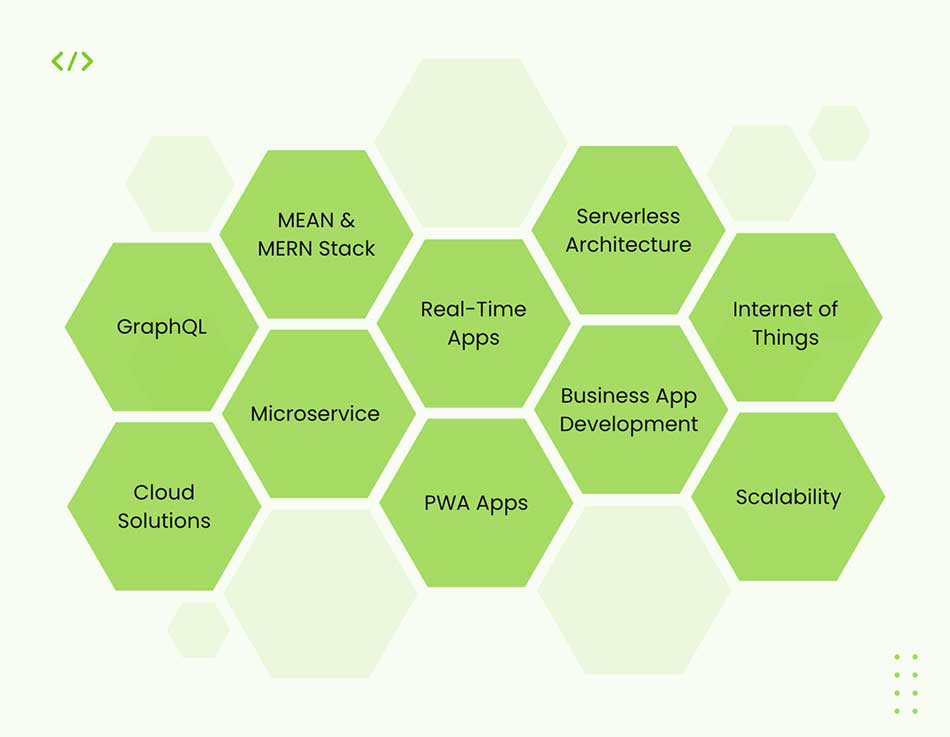In the world of software, Node.js beats anything in the path. One of the main tools used by developers to build real-time web applications, such as chat and trading platforms, is Node.js.
In recent years, technology has been enthusiastically embraced by numerous businesses and smaller enterprises. It can be used on any platform like Android, iOS, and Linux and uses API that makes it tasks less difficult.
With newer and better technology introduction in the web development industry, let us look into Node.js trends 2023:
GraphQL Deployment in Node.js apps:
With a single click and all the important databases on your screen. Isn’t this interesting? With the help of query language, GraphQL can create applications that can help you to manage large-size information and collected data.
A query language called GraphQL was developed by Facebook in 2012 and made public in 2015. It enables clients to communicate with their database more effectively by using a single endpoint rather than several and to respond in a single format rather than several (JSON, XML).
For basic APIs, the complexity added by the query language’s richness and flexibility may not be worthwhile. An ancestor set cannot be returned in a single query from a GraphQL interface that reports a person’s parents, for example.
Due to its capacity to manage massive volumes of data from numerous sources simultaneously, GraphQL has become more and more popular among developers. This enables speedier Node.js application development.
Internet of Things (IoT):
The “Internet of Things” (IoT) refers to the expanding number of gadgets connected to the Internet. These devices could be anything from home appliances to any wearable technology to sensors in watches that monitor your health. What gives these devices their strength is their capacity to connect to one another and share data through a network.
In the near future, this feature will increase the demand for Node.js in software development services, and make it unique among its own competitors.
Microservices:
In these recent years, users have seen a rise in the popularity of the software architecture known as microservices. A microservices architecture consists of discrete, autonomous services that each run in their own process and communicate using simple tools like an HTTP resource API.
Developers may create their microservices using Node.js framework 2023 more easily and enjoy these luxuries of modern creation and automation.
Rapid development, continuous delivery, deployment, scalability, and resilience are all made possible by microservice architecture. Additionally, it helps developers focus solely on one core service at a time without considering how their modifications might affect other services.
These services can be created using tools of recently introduced Node.js development trends, and these are mostly centered around business skills.
Real-Time Applications:
Real-time applications have been taking the place of the previous levels in several sectors. Customers today are increasingly drawn to a company’s website or mobile application when they receive real-time updates. This is evident in popular online platforms like Amazon and Flipkart.
Real-time apps enable users to engage interactively with various programs, spanning online gaming to retail experiences.
Because the Node.js framework 2023 enables them to build scalable, rapid, and multi-request-capable web apps, experienced NodeJS developers favor real-time applications.
According to a Grandview Research estimate, the market for international web real-time communication would increase by 43.4% between 2020 and 2027. It has been anticipated by them that more businesses will begin utilizing Node.js trends in 2023 as their main source of programming language as a result of the rising need for real-time apps.
Some of the most frequent real-time application use cases for Node.js include the following:
- Online gaming apps
- Video conferencing applications
- Instant messaging applications
- Apps for making purchases in online shops
- Online gaming apps
- Apps for document sharing
- Internet Voice Protocol
Serverless Architecture Development:
Serverless architecture is a current and popular trend in the market for developing and distributing apps. By adopting this innovative approach, developers can fully focus on creating their apps without the burden of managing servers, databases, or any other infrastructure.
Many renowned companies, such as Amazon Web Services (AWS) and Google Cloud Platform (GCP), have embraced serverless architectures. They now offer convenient solutions for developers seeking to create applications without the burden of infrastructure management.
Serverless architecture has various advantages. Some of them are as follows:
● Business priorities logic
Users can devote more time to creating their essential business logic and enhancing the quality of their code because they don’t have to worry about managing infrastructure. They don’t have to worry about any server issues as such.
● Quickly deploy
Everyone is aware that serverless architecture is quick. You can deploy apps swiftly within a few hours because there is no infrastructure construction to cause you to be delayed. Quicker deployments also make scalability simpler.
● Extremely scalable
Because there is no need for prior resource provisioning, serverless designs are very scalable. They can automatically adjust to variations in demand for your application without having to make any difficult changes.
MEAN & MERN Stack:
MongoDB, Node.js, Express.js, and AngularJS are all main components of the MEAN stack, which is a popular web development tool used by both startups and established businesses. Employers are searching for MEAN developers as MEAN is preferred by experienced MERN stack developers due to its versatility and simplicity.
MERN stands for MongoDB, Express, React, and NodeJS as a whole. Similar to MEAN, however, when React orAngularJS are added, this stack becomes ideal for front-end development. The computing world adores both stacks for their simplicity and ability to create complex applications with everything included in a single package.
Cloud Computing:
Internet-based computing helps you to provide shared computing resources and data on demand to PCs and other devices. Similar to a public utility, cloud computing relies on resource sharing to achieve enhanced performance and scalability.
- Cloud computing is a logical progression that starts from centralized mainframe-based computing, where all computation and processing takes place inside the mainframe.
- Instead of purchasing hardware or software, users can access applications, files, and services via the Internet just because of one thing: cloud computing.
- This enables businesses to forego expensive capital expenditures and instead focus on business expansion.
As more companies use the cloud for its efficiency and cost-effectiveness, NodeJS usage is growing in cloud computing solutions like AWS Lambda or Azure Functions.
DevOps:
NodeJS was actually created with the idea of collaboration among different pantheons. It enables programmers to write code that runs on both the client and server sides of an application while always keeping them in sync with the help of JavaScript code that makes it runs on both sides of the application. This facilitates their ability to work together.
- DevOps helps its users to shorten the time between writing code and putting it into action by automating a lot ofmanual tasks, which are also repetitive in nature.
- Automation of infrastructure installation, configuration, packing, and deployment is what it takes part in.
The Node.js framework may be used to develop scalable and cloud-based apps, making it an excellent fit for the DevOps environment.
DevOps believes in the integration culture between software developers and IT information(IT) operations professionals. Therefore, it has a great chance of putting a strong foothold in the market. If you are looking for an efficient Node js development provider, then you can stop your search at the landing page of IntelliSource.
Fast And Flexible Apps Development Using Node.js:
As you have already noticed how Node.js is a valuable tool for developers because it enables them to create projects with increased scalability and adaptability, along with saving time while doing so.
As Node.js is single-threaded and asynchronous, app developers can easily manage multiple processes concurrently without compromising the effectiveness or progress of any of the tasks. This is one of the most recent developments in Node.js development and makes a significant contribution to the multitasking era.
Without needing to alter the app foundation as a whole, Node.js enables app developers to make big modifications to their apps. This makes it simpler to expand their audience and implement substantial application improvements.
Evidently, Node.js is a flexible framework for creating apps and managing multitasking, two important aspects for enterprises. Node.js provides a wide range of flexibility and acts as a perfect tool for Node jsdevelopment company.
Consult Expert Node Developers fromIntelliSource:
IntelliSourcehas many years of expertise in creating scalable and highly accessible online apps by using various frameworks and technologies; our team of skilled Node.js engineers is here to help you with anything.
Our Node.js engineers from the IntelliSourcedevelopment business have extensive expertise in building sophisticated web apps using this Node.js development trends technology stack.
We offer a full solution for all of your web application development requirements. We are dedicated to providing services to our customers and assisting them in succeeding by producing high-quality applications within set financial and schedule constraints, whether they are a big gun or a new undertaking in the field.



